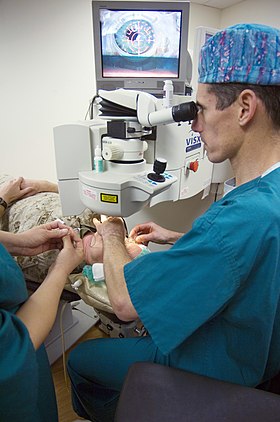Lasik
| LASIK | |
|---|---|
| Intervention | |

LASIK surgery using an excimer laser at US National Naval Medical Center Bethesda
|
|
| ICD-9-CM | 11.71 |
| MeSH | D020731 |
| MedlinePlus | 007018 |
LASIK or Lasik (laser-assisted in situ keratomileusis), commonly referred to as laser eye surgery or laser vision correction, is a type of refractive surgery for the correction of myopia, hyperopia, and astigmatism. The LASIK surgery is performed by an ophthalmologist who uses a laser or microkeratome to reshape the eye's cornea in order to improve visual acuity. For most patients, LASIK provides a permanent alternative to eyeglasses or contact lenses.
LASIK is most similar to another surgical corrective procedure, photorefractive keratectomy (PRK), and both represent advances over radial keratotomy in the surgical treatment of refractive errors of vision. For patients with moderate to high myopia or thin corneas which cannot be treated with LASIK and PRK, the phakic intraocular lens is an alternative. As of 2011, over 11 million LASIK procedures had been performed in the United States and as of 2009 over 28 million have been performed worldwide.
In 2006, the British National Health Service's National Institute for Health and Clinical Excellence (NICE) considered evidence of the effectiveness and the potential risks of the laser surgery stating "current evidence suggests that photorefractive (laser) surgery for the correction of refractive errors is safe and efficacious for use in appropriately selected patients. Clinicians undertaking photorefractive (laser) surgery for the correction of refractive errors should ensure that patients understand the benefits and potential risks of the procedure. Risks include failure to achieve the expected improvement in unaided vision, development of new visual disturbances, corneal infection and flap complications. These risks should be weighed against those of wearing spectacles or contact lenses." The FDA reports "The safety and effectiveness of refractive procedures has not been determined in patients with some diseases."
...
Wikipedia
